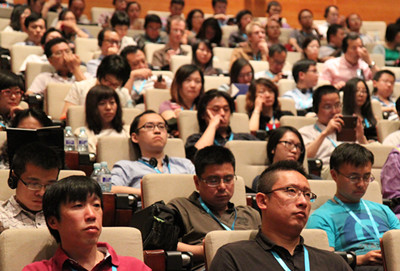Press

2014 StoryDrive Asia Conference (Photo: CY. Schmidt)
StoryDrive ASIA 2014 – Impressions from Day 1
Maja Linnemann, November 30. 1999
The StoryDrive Asia (formerly StoryDrive China) conference was opened in the morning on Thursday May 29th in Beijing by two short welcome speeches by Jürgen Boos, president of the Frankfurt Bookfair and Mr. Li Yan, vice president of China Publishing Group.
This was followed by a series of insightful presentations, discussions and a workshop for the audience. According to the organizers, 70% of the participants were from publishing companies and a majority were first time participants. Also, this year’s conference had attracted the interest of media professionals not only from China but also from many other countries in the region, such as Japan, Korea, Thailand, Singapore.
First in line was Beijing Normal University professor Ms. Yu Dan on the question of how to develop stories from traditional Chinese culture with emphasis on a non-Chinese audience. Prof. Yu is famous in China for her TV lectures on the Chinese philosopher Confucius and the adaption of his 2500-year old teachings for modern day life. She started her lecture with the stories and concepts behind Chinese writing and quoting many examples: “Basically, there is a story behind every Chinese character.“ She also elaborated on the differences of Chinese and Western art, music and architecture and finally on the source of everyday life for making up stories, from children’s games to tea culture. All these have the potential to be part of the texture of Chinese storytelling.
Ms. Yu Dan’s presentation was contrasted on stage by Martina and Simon from Canada, whose long running video blogs on Korean culture represent a quirky and very young way to create media products and characters (i.e. themselves) and engage with fans and the audience. The couple shared the history of their brand eat.your.kimchi which developed from a private venture in 2008 – quote Martin: “In the beginning we had four views – our parents” – to an accumulated 178,808,443 views up until now. Their episodes even have found their way onto Chinese video websites, where their main platform Youtube is normally blocked. Their business model has developed from 100% earnings from Youtube ads to product endorsements (recently their started a cooperation with car producer KIA and visit different places in Korea with a specially designed eat.your.Kimchi car) to their own merchandise shop. An eat.your.Kimchi coffee shop where fans will be able to meet Martina and Simon is to be opened soon. Which proves that the virtual world is one thing but there is always a desire to connect with real people!
As a raison d’être for their success they stressed sincerity as well as their naïve enthusiasm and their way of engaging in many ways with their audience, many of whom are outside Korea.
After that, Triona Campbell from Ireland presented two case stories of her company beActive Media: “Collider” and “Beat Girl” are cross media stories that successfully work on many platforms. Ms. Campell said that she originally comes from the film business and has come to consider a feature film as “the most expensive prototype” when developing a story. So nowadays in her business model, the production of a feature film stands at the end of the “production” line whereas at the beginning there are many other ways to test a story’s strength. In her presentation, Ms. Campbell emphasized the importance of localization: “For Collider we had six main characters and we casted six different nationalities, so that audiences in different countries each have one character they can strongly relate to” and added useful advice on how to engage the fans in marketing when the budget is low.
After the lunch break, moderator and coach Syd Atlas successfully battled an inevitable drowsiness in the audience with a lively condensed workshop on how to pitch a story.
The German, US-American and China participants in a discussion on international cooperation all stressed the need for this kind of opportunity, i.e. the StoryDrive conference, to establish personal contacts even though the borderless virtual world seems to easily foster cooperation across cultures and industries. As it turned out from the discussion, the question of content localization will remain a crucial one for the time being.
The remaining afternoon slots were taken by ● Kurt Beidler, vice CEO of AMAZON China, who hosted the lucky draw of 5 Kindle reading devices and held his speech on the positive effects of the emergence of e-books on the sales of paper books entirely in fluent mandarin Chinese. ● Professor Dr. Ir. Piet Verhoeve, director of Innovation & Technology at iMinds, Belgium who spoke on the questions of how and why to innovate and finished by saying: “Since I usually communicate with the technical guys, it is very valuable for me to be at this conference and listen to the approaches and viewpoints of the media professionals who are quite different from what I usually hear. This really opens the mind and s conductive to innovation.” ● And last but not least there was Claudius Niessen, Managing Director of the German Creative Writing Program in Leipzig, Germany. He spoke on the role of the author in the digital age, the need of authors to market themselves, to collaborate and presented exciting examples of how to bring literature and writers to their readers.
“StoryDrive” came to China for the first time as part of the 1st CIFTIS in 2012. It then attracted lots of exhibitors, buyers and book fans. In 2014, “StoryDrive China” was upgraded to “StoryDrive Asia”. The rebranding points to the acknowledgment of the growing importance of the Asian region in the media and entertainment world by the Frankfurt Bookfair as well as the ambition of the organizers to grow into a truly Asian platform for the exchange of ideas and fostering international cooperation.
http://blog.book-fair.com/2014/05/30/storydrive-asia-2014-impressions-from-day-1/































